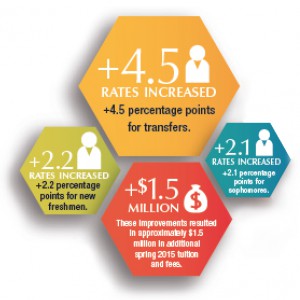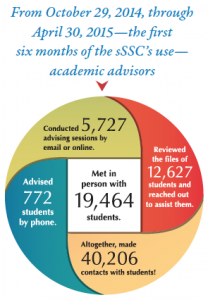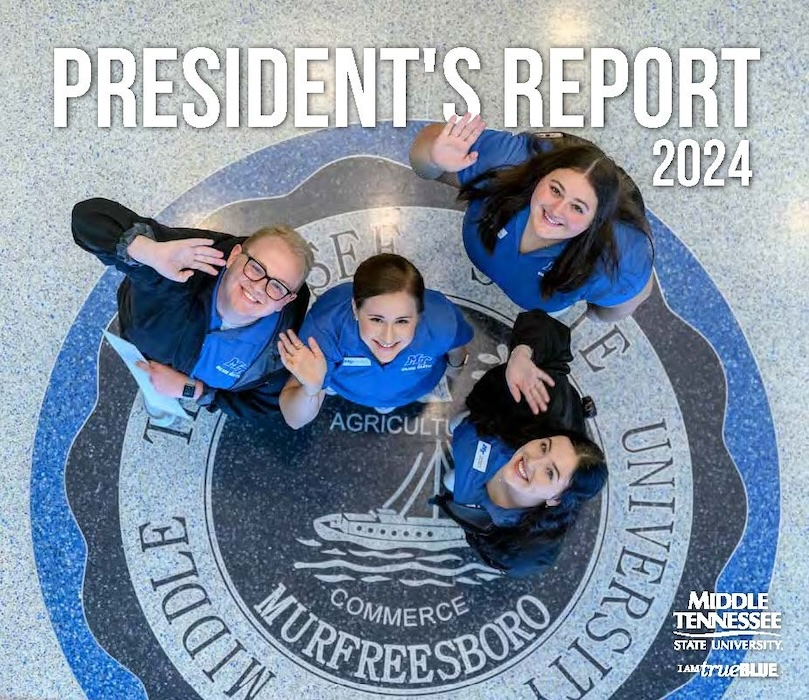Hitting Our Stride
Filed Under: President's Post, Featured Articles
As we all know by now, Tennessee’s new funding model for higher education places the highest priority on student progress, matriculation, and graduation success. Gov. Bill Haslam’s Drive to 55 initiative seeks to improve Tennessee’s workforce by increasing the percentage of Tennesseans with postsecondary degrees or certificates to 55 percent.
Last academic year, we made great strides in helping our students stay enrolled and on a clear path to earning a degree. Our achievements can be largely attributed to our ambitious Quest for Student Success, which has proven to be an effective roadmap in the effort to improve retention and graduation.
 Within the first six months of implementing just two key components of the Quest—a new advising model and use of a predictive analytics software system to better monitor student progress— significant increases in persistence were measured:
• Persistence rates increased by +2.2 percentage points for new freshmen.
• Rates increased +4.5 percentage points for transfers.
• Rates increased +2.1 percentage points for sophomores.
• These improvements resulted in approximately $1.5 million in additional spring 2015 tuition and fees.
Within the first six months of implementing just two key components of the Quest—a new advising model and use of a predictive analytics software system to better monitor student progress— significant increases in persistence were measured:
• Persistence rates increased by +2.2 percentage points for new freshmen.
• Rates increased +4.5 percentage points for transfers.
• Rates increased +2.1 percentage points for sophomores.
• These improvements resulted in approximately $1.5 million in additional spring 2015 tuition and fees.
The near future also looks bright. Although official data will not be available until census on September 7, 2015, trend projections have consistently indicated that MTSU will achieve record or near-record retention increases in the upcoming semester for first-time freshmen, new transfer students, and sophomore students.
The Quest is helping redefine and refocus our efforts and investments in recruitment, advising, and classroom teaching to better meet the needs of our students. With broad support from the University’s central administrative team, led by Provost Brad Bartel and under the direction of Dr. Rick Sluder, vice provost for student success, and the leadership of the academic deans, department chairs, and faculty, our plan has shown tangible progress.
Driving those increases are a number of specific initiatives:
• The redesign of more than 20 courses has enhanced the learning environment for students, enabling them to better master the material and offering a greater chance for success. By the close of the fall 2015 semester, 28 courses will have been through some form of redesign. Eleven of MTSU’s top 12 most predictive and most enrolled courses will have been redesigned.
• The recent hiring of 47 new college-based academic advisors has greatly enhanced our ability to effectively address critical advising and academic support needs.
• The use of new predictive analytics software has helped us sharpen our focus on areas that have the greatest opportunity to positively affect academic needs and achieve measurable, sustainable results.
 From October 29, 2014, through April 30, 2015—the first six months of the system’s use—academic advisors
From October 29, 2014, through April 30, 2015—the first six months of the system’s use—academic advisors
- met in person with 19,464 students,
- conducted 5,727 advising sessions by email or online,
- advised 772 students by phone,
- reviewed the files of 12,627 students and reached out to assist them, and
- altogether, made 40,206 contacts with students!
We have long said that we are a student-centered institution, and I am pleased that our actions are validating that for students and our peers. But with this recognition it’s critical that we not rest on our laurels. There remains much to be done. Looking forward to the 2015–16 academic year, in addition to the previously mentioned efforts underway, there are a number of other activities we are launching: • A total of twenty-eight (28) Raider Learning Communities are offered in fall 2015. Students in RLCs attend paired courses where instructors create collaborative learning experiences to not only magnify student learning, but also allow them to build personal and professional networks. • Our highly successful Scholars Academy will be expanded to serve greater numbers of first-generation and/or at-risk students as they prepare for college. • To continue to improve sophomore retention, a Second-Year Experience program has been developed. • Restructuring our financial aid program to provide better incentives and support for students who make sustained progress toward completing their degree. • Initiating a new program called Rebound , which provides academic support and assistance in retaining freshmen who had below a 2.0 at the end of the fall 2014 semester.
For example, a Finish Line Scholarship has been developed for new freshmen and transfer students that will reward students who stay on track to finish their degrees by taking an average of 15 hours each semester. • Expanding our dual-enrollment program . Courses counting for both high school and MTSU graduation requirements are available at our partnering high schools, on the MTSU campus, and online. • Attracting non-traditional students to our campus through unique programs including the Recapture program that focuses on adults who earned a significant number of college credits but did not graduate. • Building on our existing efforts to support our military students and veterans.
Clearly, the University is committed to the success of every student, and we have committed considerable resources to making MTSU a success-oriented institution. However, the interactions you have in your classrooms and in your encounters with students form the basis of everything we do . I would urge each of you to take a look at your own students and classes, asking yourself “What can I do to make this experience better, more meaningful, and more effective?” I ask—no urge— each of you to be accountable and accept your responsibility to help take us to an even higher level of achievement. Much can be done if we all work together.
Best wishes for a wonderful fall semester, and I look forward to an even greater year for our Blue Raider family!



